France | DR Congo |
|---|---|
| Diplomatic mission | |
| Paris | Kinshasa |
Relations between RDC and France are bilateral diplomatic relations between the Democratic Republic of Congo in Central Africa and the French Republic in Europe.
France | DR Congo |
|---|---|
| Diplomatic mission | |
| Paris | Kinshasa |
Relations between RDC and France are bilateral diplomatic relations between the Democratic Republic of Congo in Central Africa and the French Republic in Europe.
In 1961 France sent colonel Roger Trinquier to support the coup d'etat of Mobutu Sese Seko. [1]
Valéry Giscard d'Estaing decided to send the French Army to Zaïre in 1977 to help Mobutu, whose régime threatened to crumble before rebels of the Congolese National Liberation Front in the Shaba I war. France intervened again the following year in the Shaba II war.
In the 1994 Rwandan genocide, Mobutu Sese Seko authorized France to use the Kivu region as a base for Operation Turquoise, a French military operation to put an end to the massacres in Rwanda.
French is the official language of Congo-DRC, and both France and the DRC are full members of the Organisation internationale de la francophonie (International Organization of French Speakers).
Several Alliances françaises and Instituts français operate in the RDC (notably the Institut français in Kinshasa), as well as the lycée Français René Descartes de Kinshasa. France has also trained certain Congolese administrators at the École Nationale d'Administration. [2]
France committed at the end of President Kabila's second to the European Union and the United Nations Security Council that it would enforce human rights, ldemocracy and the Congolese constitution. [3]
France provides Congo-DRC with food and medical assistance. French food aid has increased since the food crisis of 2008, reaching 17 million euros between 2008 and 2012. [4]
France primarily imports food and agricultural products from the DRC, whose primary imports from France are pharmaceuticals and mechanical equipment. [5]
The DRC receives support from French experts to help it improve its budgetary and administrative performance, in accordance with the debt reduction and development contract (C2D) between the two countries. [6]
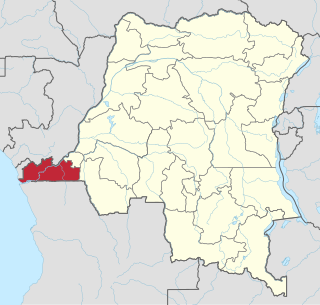
Kongo Central, formerly Bas-Congo is one of the 26 provinces of the Democratic Republic of the Congo. Its capital is Matadi.
Antoine Ghonda Mangalibi was the foreign minister of the Democratic Republic of the Congo from June 30, 2003, until July 23, 2004.
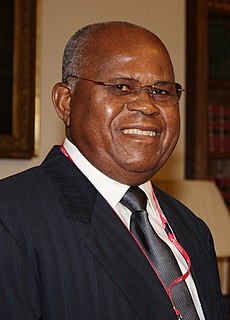
Étienne Tshisekedi wa Mulumba was a Congolese politician and the leader of the Union for Democracy and Social Progress (UDPS), the main opposing political party in the Democratic Republic of the Congo (DRC). A long-time opposition leader, he served as Prime Minister of the country on three brief occasions: in 1991, 1992–1993, and 1997.

Lesbian, gay, bisexual, and transgender (LGBT) persons in the Democratic Republic of the Congo face legal challenges not experienced by non-LGBT residents. Same-sex sexual activity is legal for both males and females in the Democratic Republic of the Congo (DRC), although LGBT individuals may still be targeted for prosecution under public indecency provisions on occasion.

Ngaliema is a municipality (commune) in the Lukunga District of Kinshasa, the capital city of the Democratic Republic of the Congo.
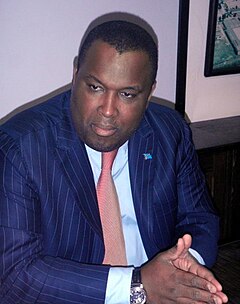
François-Joseph Mobutu Nzanga Ngbangawe is a Congolese politician. A son of the long-time President Mobutu Sese Seko, he served in the government of the Democratic Republic of the Congo under President Joseph Kabila from 2007 to 2011, initially as Minister of State for Agriculture and subsequently as Deputy Prime Minister for Basic Social Needs. He was dismissed from the government in March 2011. In 2008, he founded the Union of Mobutist Democrats as the successor to his father's Popular Movement of the Revolution and has led the party since.
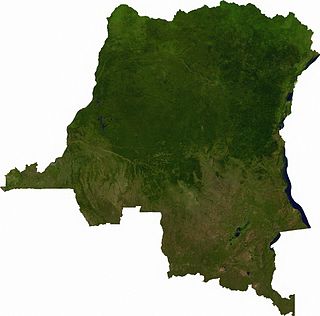
Articles related to the Democratic Republic of the Congo include:
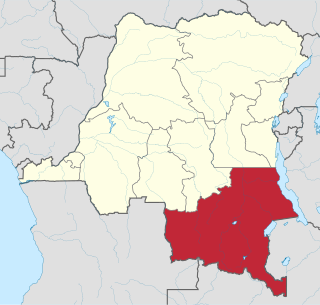
The Congolese National Liberation Front is a political party funded by rebels of Katangese origin and composed of ex-members of the Katangese Gendarmerie. It was active mainly in Angola and Zaire during the 1970s.

Democratic Republic of the Congo–United States relations are the international relations between the Democratic Republic of the Congo and the United States of America.

Democratic Republic of the Congo–Russia relations are the bilateral foreign relations between the Democratic Republic of the Congo and Russia. The Democratic Republic of the Congo has an embassy in Moscow and an honorary consulate in Yekaterinburg. Russia has an embassy in Kinshasa. The relations between the two countries were established on July 7, 1960, and restored since November 30, 1967.

Its location in the center of Africa has made the Democratic Republic of the Congo a key player in the region since independence. Because of its size, mineral wealth, and strategic location, Zaire was able to capitalize on Cold War tensions to garner support from the West. In the early 1990s, however, with the end of the Cold War and in the face of growing evidence of human rights abuses, Western support waned as pressure for internal reform increased.

Matata Ponyo Mapon is a Congolese political figure who was Prime Minister of the Democratic Republic of the Congo from 18 April 2012 to 17 November 2016. Previously he served as Minister of Finance from 21 February 2010 to 12 April 2012; as Prime Minister, he retained responsibility for the finance portfolio. He currently serves as Senator for Maniema.

The People's Palace or Palace of the People is the seat of the National Assembly and the Senate in Kinshasa, Democratic Republic of Congo, formerly Zaire. It was completed in 1979 with a line of credit from the People's Republic of China.
Baudouin Banza Mukalay Nsungu was a Congolese politician, born in Coquilhatville. He had most recently served as the Minister of Culture and the Arts of the Democratic Republic of Congo from December 2014 until his death in May 2016. Previously, Mukalay served as Minister of Youth, Sports, Culture and the Arts from April 2012 until December 2014 under President Joseph Kabila and Minister of Mines from 1996 to 1997 under Zaire President Mobutu Sese Seko.

Léonard She Okitundu Lundula is a Congolese diplomat who has served as the Minister of Foreign Affairs and International Cooperation and one of the Vice Prime Ministers of the Democratic Republic of the Congo since December 2016 until March 2019. He has formerly held a number of other government offices in the DRC and Zaïre, being the Foreign Minister before (2000–2003), a Senator, and also chief of staff of President Joseph Kabila's administration.
Faustin Munene is a Congolese military officer and politician known for his opposition to Mobutu Sese Seko, leader of Zaïre, and later President Joseph Kabila of the Democratic Republic of the Congo. He held a number of senior military posts under Laurent-Désiré Kabila after the fall of Mobutu, including commander of the Force Aérienne Congolaise, the DRC air force, and Deputy Minister of the Interior. Since 2010, he has been living in exile in the neighboring Republic of the Congo, having fled there since being accused by the DRC authorities of plotting a coup.

Democratic Republic of the Congo–Turkey relations refer to the bilateral relations between the Democratic Republic of the Congo and Turkey. Turkey has an embassy in Kinshasa since 1974, and the DR Congo opened its embassy in Ankara in 2011.

Pierre Yambuya Lotika Kibesi was a Zairean helicopter pilot, civil servant, and political refugee.

Democratic Republic of the Congo–Germany relations are primarily characterized by the development aid that Germany provides in the DR Congo. Germany is one of the most important donor countries to the DR Congo.
Tharcisse Kasongo Mwema Yamba-Yamba was a Congolese journalist and politician.